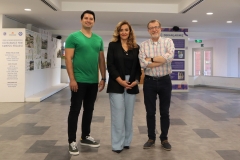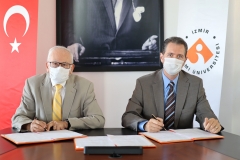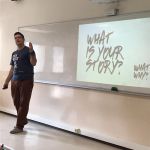
FACULTY OF BUSINESS
Department of Business Administration
GEHU 202 | Course Introduction and Application Information
| Course Name |
Current Issues in World Politics
|
|
Code
|
Semester
|
Theory
(hour/week) |
Application/Lab
(hour/week) |
Local Credits
|
ECTS
|
|
GEHU 202
|
Fall/Spring
|
3
|
0
|
3
|
6
|
| Prerequisites |
None
|
|||||
| Course Language |
English
|
|||||
| Course Type |
Service Course
|
|||||
| Course Level |
First Cycle
|
|||||
| Mode of Delivery | - | |||||
| Teaching Methods and Techniques of the Course | DiscussionCase StudyLecture / Presentation | |||||
| Course Coordinator | ||||||
| Course Lecturer(s) | ||||||
| Assistant(s) | ||||||
| Course Objectives | This class aims to provide students with a general perspective on the main issues and debates in current global politics. It intends to deepen students' understanding of the world by covering various debated issues within the scope of international politics, economics and sociology in a healthy discussion environment. |
| Learning Outcomes |
The students who succeeded in this course;
|
| Course Description | This course will discuss the main issues in today's world such as globalization, immigration crisis, terrorism, racism, social movements, global warming, gender inequality, the rise of China, Covid-19 pandemic and rising populist trends. The course will analyze the political, economic, social and environmental dimensions of these much-debated conflicts that shape the global world. |
|
|
Core Courses | |
| Major Area Courses | ||
| Supportive Courses | ||
| Media and Management Skills Courses | ||
| Transferable Skill Courses |
WEEKLY SUBJECTS AND RELATED PREPARATION STUDIES
| Week | Subjects | Related Preparation |
| 1 | Introduction to some of the basic trends in world politics. | |
| 2 | Globalization | Manfred B. Steger, Globalization: a very short Introduction. Chapter 5, pp. 83-94. |
| 3 | Global Economic Inequality | To see 1: “True Cost”, documentary 2: “The New Rulers of the World”, documentary To read: Manfred B. Steger, Globalization: a very short Introduction. Chapter 5, pp. 83-94. |
| 4 | The Rise of China | To see: “China: Power and Prosperity”, by PBS, documentary. To read /listen to: “Making China Great Again”, article by Evan Osnos (The New Yorker). Available online. |
| 5 | Race and Racism | To see: “Good Hair: Perceptions of Racism” - Short film. To read: Ali Rattansi, A very short introduction: Racism. Chap.1, pp 4-12. |
| 6 | Terrorism, War, and Security | To see: “Hotel Rwanda”, film. To read: “Routledge Handbook of Security studies” edt. by Myriam Dunn Cavelty and Thierry Balzacq, Part 2, section 13: “Terrorism and counter-terrorism” by Oldrich Bures |
| 7 | Climate Change | To see: “This Changes everything”, documentary by Naomi Klein To read: “Climate Change: what everyone needs to know”, by Joseph Room, the preface. |
| 8 | Midterm Exam | |
| 9 | Global migration crisis | To see: “For Sama”, film. To read: “International Migration: A very short introduction” by Khalid Koser (2017) Chapter 1: Why migration matters? |
| 10 | Social Movements | To see: “Athena”,film. To read: “Social Movements and New Technology”, by Victoria Carty (2018), Introduction: the digital impact on social movements. pp.1-17. |
| 11 | Democratic Backsliding and the Rise of Populism | To see: “Die Welle”- the Wave (2008), film. To read: “What is Populism?” By Jan-Werner Müller (2016), introduction: Is everyone a populist? Pp. 1-6. |
| 12 | Gender in Global Politics | To see: “Milk” by Gus Van Sant, film. To read: “The gendered society” by Michael Kimmel, introduction: Human beings, an engendered species, pp. 1-9. |
| 13 | Student Presentations | |
| 14 | Student Presentations | |
| 15 | Student Presentations | |
| 16 | Final Exam |
| Course Notes/Textbooks | Mark Beeson and Nick Bisley, Issues in 21st Century World Politics (Palgrave McMillian, 2010). |
| Suggested Readings/Materials |
EVALUATION SYSTEM
| Semester Activities | Number | Weigthing |
| Participation | ||
| Laboratory / Application | ||
| Field Work | ||
| Quizzes / Studio Critiques | ||
| Portfolio | ||
| Homework / Assignments | ||
| Presentation / Jury |
1
|
20
|
| Project | ||
| Seminar / Workshop | ||
| Oral Exams | ||
| Midterm |
1
|
40
|
| Final Exam |
1
|
40
|
| Total |
| Weighting of Semester Activities on the Final Grade |
2
|
60
|
| Weighting of End-of-Semester Activities on the Final Grade |
1
|
40
|
| Total |
ECTS / WORKLOAD TABLE
| Semester Activities | Number | Duration (Hours) | Workload |
|---|---|---|---|
| Theoretical Course Hours (Including exam week: 16 x total hours) |
16
|
3
|
48
|
| Laboratory / Application Hours (Including exam week: '.16.' x total hours) |
16
|
0
|
|
| Study Hours Out of Class |
11
|
2
|
22
|
| Field Work |
0
|
||
| Quizzes / Studio Critiques |
0
|
||
| Portfolio |
0
|
||
| Homework / Assignments |
0
|
||
| Presentation / Jury |
1
|
20
|
20
|
| Project |
0
|
||
| Seminar / Workshop |
0
|
||
| Oral Exam |
0
|
||
| Midterms |
1
|
30
|
30
|
| Final Exam |
1
|
30
|
30
|
| Total |
150
|
COURSE LEARNING OUTCOMES AND PROGRAM QUALIFICATIONS RELATIONSHIP
|
#
|
Program Competencies/Outcomes |
* Contribution Level
|
||||
|
1
|
2
|
3
|
4
|
5
|
||
| 1 | To be able to solve problems with an analytical and holistic viewpoint in the field of business administration. |
|||||
| 2 | To be able to present the findings and solutions to the business problems in written and oral formats. |
|||||
| 3 | To be able to interpret the application of business and economic concepts, and philosophies at the national and international levels. |
|||||
| 4 | To be able to use innovative and creative approach for real-life business situations. |
|||||
| 5 | To be able to demonstrate leadership skills in different business situations. |
|||||
| 6 | To be able to interpret the reflections of new technologies and softwares to business dynamics. |
|||||
| 7 | To be able to integrate knowledge gained in the five areas of business administration (marketing, production, management, accounting, and finance) through a strategic perspective. |
|||||
| 8 | To be able to act in accordance with the scientific and ethical values in studies related to business administration. |
|||||
| 9 | To be able to work efficiently and effectively as a team member. |
|||||
| 10 | To be able to have an ethical perspective and social responsiveness when making and evaluating business decisions. |
|||||
| 11 | To be able to collect data in the area of business administration and communicate with colleagues in a foreign language ("European Language Portfolio Global Scale", Level B1). |
|||||
| 12 | To be able to speak a second foreign at a medium level of fluency efficiently. |
|||||
| 13 | To be able to relate the knowledge accumulated throughout the human history to their field of expertise. |
|||||
*1 Lowest, 2 Low, 3 Average, 4 High, 5 Highest
NEWS |ALL NEWS

Silver medal in Italy
Onur Cavit Biriz, a national surfer and student of Izmir University of Economics (IUE), won the silver medal for our country by

273 thousand lira research support for project on waste aggregators
The ‘waste aggregators’, who collect recyclable materials such as paper, glass and metal, and contribute to nature and the economy by recycling

Transfer to the ‘Big Four’
4 young people who graduated from Faculty of Business, Izmir University of Economics (IUE) quickly climbed the ladder of success and transferred

Exemplary cooperation from IUE and PwC to support education
The agreement made with PwC firm will provide priority internship and job opportunities to the students of IUE Accounting and Auditing Program.

IUE student Cavit will represent the country in ‘Tokyo’
Onur Cavit Biriz from Izmir, the owner of many cups and medals in Turkey, who started windsurfing as a hobby at the

Philip Harding, Co-founder of Impact Junkie visited IEU
BA201 - Principles of Marketing class hosted social entrepreneur Philip Harding, the founder of Impact Junkie. Impact Junkie is one of the most

